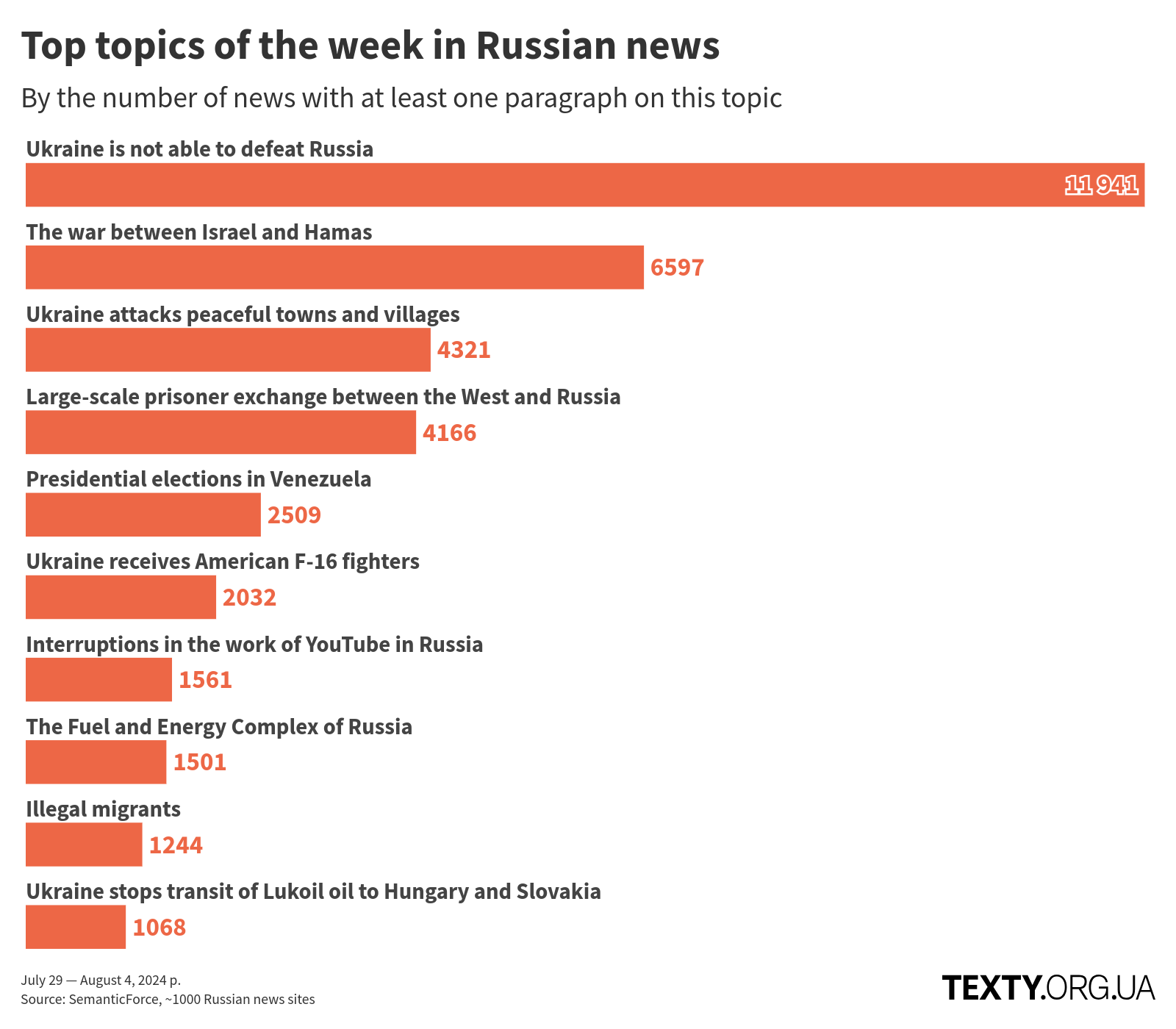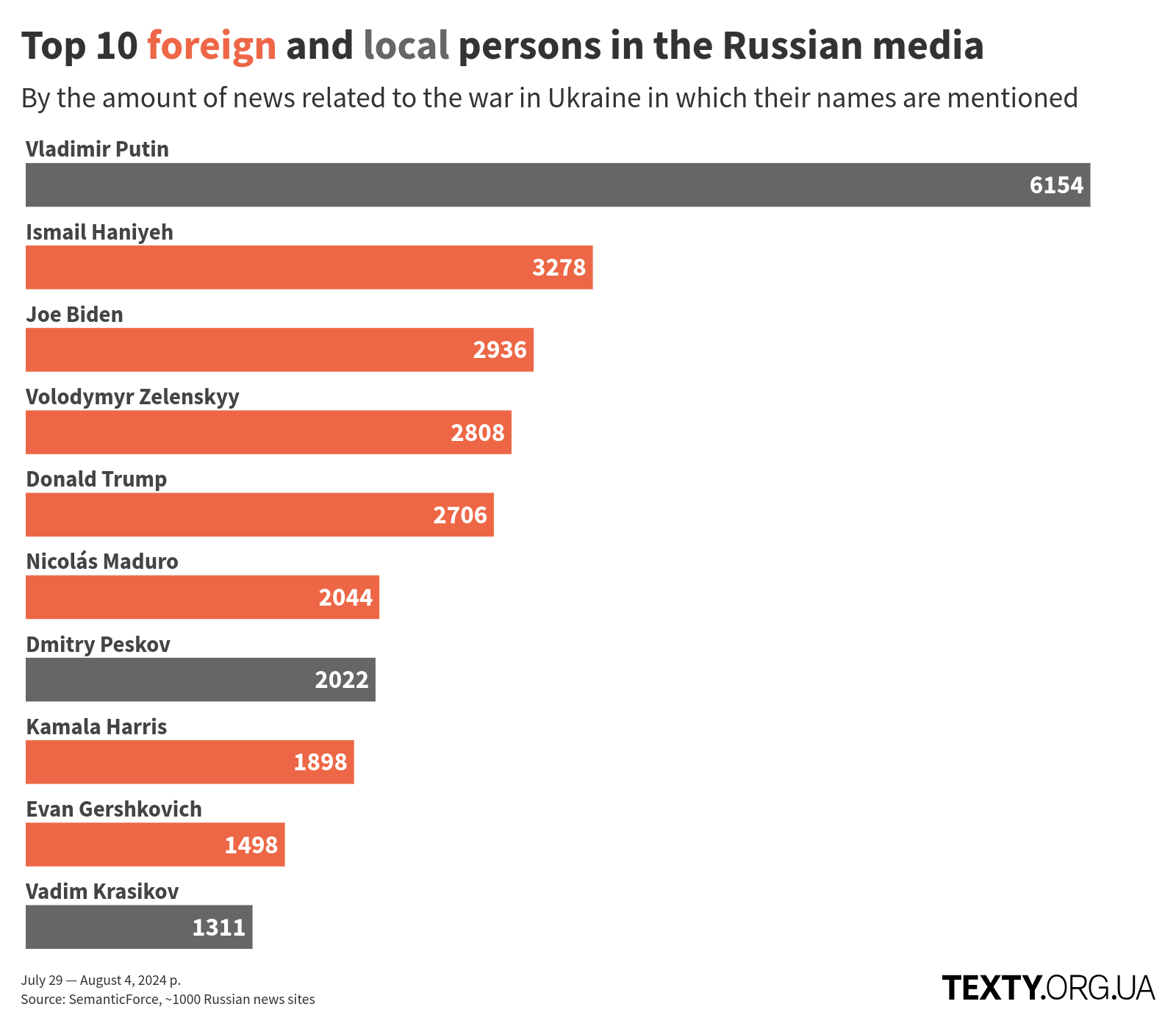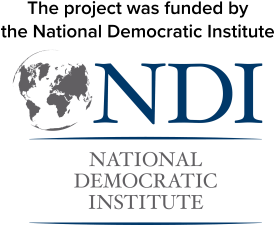The return of villains in the guise of heroes. Russian Media Monitoring Report, July 28 – August 4, 2024
The international prisoner exchange between Russia and the West on August 1 was an important event for both sides. Russia turned the exchange into a huge show emphasizing its power and influence. The Kremlin's propaganda machine created a picture of President Putin's determination and commitment to his citizens and presented the returned Russians as heroes. At the same time, the West received alleged "enemies of Russia" who were, in fact, journalists, human rights defenders, and political activists.
Read about this and more in the new issue of our monitoring of Russian state media and manipulative websites that target Russian disinformation.

Operation "Free the Killer"
On August 1, a large-scale prisoner exchange took place between Russia and the West, with representatives from Russia, Belarus, the United States, Germany, Poland, Slovenia, and Norway participating. A total of 26 people were exchanged: 10 people were sent to Russia, 13 to Germany, and 3 to the United States.
Russian propaganda turned this event into a national holiday.
Putin himself came to meet the plane that transported the prisoners. This is a planned plot from the Kremlin's propaganda machine, the point of which is to show that Putin has sentiments and human feelings. Here he is meeting "dear Russians," here he is hugging them and assuring them that Russia is worried and thinking about them every day: "The Russians who returned to their homeland were personally greeted by Russian President Vladimir Putin," "The president greeted each of them with a firm handshake or hug."
The newly arrived are presented by the propaganda as real heroes. People who did not betray Russia's interests and remained loyal to the state: "He (Putin - Ed.) congratulated them on their return to their homeland, thanked them for their loyalty to the oath and promised to present them for state awards."
"Russia has never forgotten about its citizens, the president assured," disinformers gleefully picked up Putin's words. They are meant to confirm the old propaganda cliché "Russians do not abandon their own." The main message of the stories about the exchange is that Russia will not forget you and will return you to your homeland in case of problems: "The historic exchange will pave the way for new humanitarian actions so that every Russian citizen detained abroad can return to their families and friends."
In this case, spies, murderers, and cybercriminals who worked for the Kremlin were returned. In particular, they returned to Russia:
Vadim Krasikov, a professional hired killer who was convicted of murder in Germany;
Artem and Anna Dultsev, spies who were convicted in Slovenia;
Roman Selezniov, a hacker and cybercriminal;
Maxim Marchenko, convicted of participating in the purchase of dual-use goods to circumvent sanctions.
The return of the "heroes," according to propaganda, is an outstanding diplomatic achievement of Putin: "The release of the Russians was made possible by Russian President Vladimir Putin's strict demand to exchange, not extradite, convicted Americans."
Disinformers tried to write less about the adventures of returned Russians and their real role for the Kremlin.
For example, Vadim Krasikov is a killer who killed Chechen commander Zelimkhan Khangoshvili in Germany on the orders of the FSB. He is called a patriot who could not forget the brutal murder of Russians by a Chechen and acted solely out of "patriotic feelings," while Khangoshvili, who was killed by Krasikov, "was a terrorist and one of the organizers of the Moscow metro bombings." "Krasikov eliminated a super-violent terrorist. A real, absolutely brutal terrorist militant. Including an active participant in the attack on the school in Beslan. Krasikov must be free to make terrorists afraid... Krasikov's release means that thousands of terrorists will not hope to hide in the West under the wing of Western intelligence services."
Krasikov was already fighting with NATO at the time, as he eliminated a militant who "was under the protection of NATO intelligence services."
Earlier, The Wall Street Journal reported that Krasikov could have been a bodyguard for Russian dictator Vladimir Putin in the 1990s, when he was deputy mayor of St. Petersburg. And that the whole exchange was planned for the return of a professional killer.
Another example is Roman Seleznyov. According to propaganda, he was illegally convicted in the United States. In reality, Seleznev is a hacker who stole credit card data and sold it on the black market.
And now the Russian media are telling about the horrors in American prisons, where Seleznev, according to the propaganda, was not only tortured but also fed false information: "Seleznev changed several prisons. One of them was in Atlanta, it was very terrible there, all the prisoners carried knives, they were constantly killing each other. There was not a day when someone did not cut someone. I tried to stay away from them, but there were a couple of times when I was almost killed there." "Access to Russian publications was important to him, because the TV channels he could watch in prison broadcast false information."
Propaganda pushes completely different narratives about those who were returned to the West. They are "enemies" and "threats". The FSB reported this: "The Russians were exchanged for a group of people who acted in the interests of foreign states to the detriment of the security of the Russian Federation." And it doesn't matter that a significant number of them are actually Russian citizens who have essentially become political prisoners.
For example:
Aleksandra Skochilenko, a Russian artist, was arrested and sentenced to seven years in prison for changing price tags in a supermarket for anti-war leaflets.
Oleg Orlov, a human rights activist and board member of the International Memorial Society, was convicted for allegedly discrediting the Russian Armed Forces by speaking out against the war.
Kevin Lick, born in 2005 in Germany (he also has Russian citizenship), became the youngest Russian resident to be convicted of treason. He allegedly took pictures of a military unit in Maikop and sent them to Germany. He was sentenced to four years.
For propaganda, these are superfluous elements in Russian society. They do not support the war and Putin, and therefore have no right to live freely in Russia: "A Russian patriot is someone who not only loves the country and its people, but also supports the Russian leadership when Russia is fighting its enemies - this is also a hard truth."
All those handed over by Russia were labeled in the Russian media as convicted violators of Russian laws. And next to them were the articles under which they were allegedly justly punished. For example, "discrediting the Russian army," "espionage," and "high treason." This emphasizes that the West was handed over its agents, pests and traitors.
There were questions about the number of people exchanged. "Why is it so uneven: Russia gives 16 and only receives 10 of its own." But here, too, the answer was found: the main thing is not quantity, but quality. "There is no moral equality between our intelligence officers and those working for the West, because Russia is fighting for itself and for civilization."
In this case, those who went to the West are not so important and not so much agents: "The West got: 1. A real big agent, Whelan. 2. Gershkovich, a very famous person, but rather not an intelligence officer, but a journalist who got confused in his illegal connections. 3. A small Ukrainian agent and militant, the German Krieger from Belarus. 4. 4. Yashin, Kara-Murza, Orlov - politicians who worked for the West and thus completely discredited themselves. The Russian authorities were surely happy to hand them over to Western intelligence services for final discredit. 5. A few small political activists who worked for Western projects. No one has any name for them, in the sense that no one distinguishes them. They were project executors. The Russian authorities were also happy to give them away. So this exchange is clearly in Russia's favor."
For example, before the exchange, Evan Gershkovich, a journalist for The Wall Street Journal, was a US agent in the Russian media. You can read his story of release here. After the exchange, the Russian media outlet RT published alleged evidence of his spying activities. However, the same video footage that was published contains no real evidence. Even some propagandists admit that the evidence is questionable. "On the one hand, Evan does behave like a journalist: he says 'we will publish', 'we will write', which means that the information he gives will be publicly published in a newspaper, not secretly passed to Russia's enemies. On the other hand, in a country at war, he wanted to obtain information about state secrets in the field of national defense and publish it. This is literally what Julian Assange was accused of and eventually pleaded guilty to."
Thus, most of the detainees handed over by Russia are a swap deal. They are not criminals or enemies, they are people who suffered from the totalitarian regime for their civic position, or were in the wrong place, or were provoked by the intelligence services so that they could be handed over to the West to return murderers and spies.

What else they wrote about
Kyiv is unable to defeat Russia, F-16s are already in Ukraine
Last week, the topic of war returned in a big way in the Russian media. The main narrative is that Ukraine is not capable of defeating Russia. This may be due to several factors.
First, the Russian army has localized successes on the front. In the Donetsk region, Russian troops are slowly advancing. Ordinary Russians have not received news of victories in the war for a long time, so propaganda compensates for this shortcoming: "A grouping of Russian troops, having fought long battles for the liberation of one of the key fortresses of the Ukrainian army in the DPR, managed to achieve a significant breakthrough, delivering a crushing blow to the enemy's rear and overcoming a months-long "stupor"."
Reports of a huge number of destroyed Ukrainian military and Western equipment are again appearing: "The total losses of the Ukrainian Armed Forces for the day amounted to up to 1975 soldiers, four tanks, two Bradley infantry vehicles, a Marder infantry vehicle, two M113 armored personnel carriers, and an HMMWV armored vehicle."
The Ukrainian military are simply fleeing the battlefield: "The troops of the Kyiv regime ... do not want to fight, they have not undergone any training, they are simply forced to go to the front. As soon as they have the opportunity, they surrender, run from their positions or retreat. This has happened several times in recent weeks, the analyst said."
Second, this is how propaganda responds to Ukraine's attacks. On August 3, the Defense Forces attacked the enemy's Morozovsk airfield. In particular, a warehouse where the enemy stored the KABs was hit. The Ukrainian Armed Forces also attacked a number of Russian oil depots and warehouses with fuel and lubricants in the Belgorod, Kursk, and Rostov regions.
Instead of explaining why Ukraine is still actively fighting and harming Russia, propaganda writes about shooting down enemy aircraft and victories on the battlefield. It also says that Kyiv will soon not be able to carry out such attacks: "European NATO allies have emptied their arsenals and are exhausted."
Third, the propaganda counteracts the news that Ukraine has received American F-16 fighter jets. The news of Kyiv's receipt of the planes was also among the most discussed topics in the Russian media last week: "F-16s finally arrive in Ukraine after long promises and delays in delivery".
Key points:
- It is not known for sure whether Ukraine has received the planes. This could be fake news. The planes allegedly flew in from European countries to make a sensation and returned. And Kyiv is left empty-handed: "It is possible that the F-16s flew into Lviv region from Poland just to appear in the sky and not to engage in combat."
- In fact, the planes will not be owned by Ukraine, but by NATO countries, which will only use them to intercept Russian weapons over Western Ukraine: "The F-16s will be based and maintained at NATO airfields near Ukraine's borders, such as in Poland."
- F-16s cannot harm the Russian army. There are too few of them, and Russia has excellent analogs: "Our military is certainly not going to be afraid of the F-16. This is not a "beast" that can withstand our fighters", "Again, the declared number of "six plus six" aircraft is, figuratively speaking, just tears", "If these are the latest American AIM-174B air-to-air missiles with a range of 340 kilometers, they can pose a serious threat to our fighter and bomber aircraft. But even with such a range, F-16 missiles will have to leave the Lviv region and, naturally, fall into the "field of view" of our air defense systems and Su-35 fighters, which are armed with no less destructive weapons."
- The aircraft will be used only deep over the territory of Ukraine and will not be involved in strikes against Russia: "The fighters will be used only as air defense assets. Given that Russian VKS aircraft strike without entering Ukrainian airspace, the F-16s will only have to chase Russian Geranium drones."
To summarize, the propaganda claims that the news of the arrival of the fighter jets is just a media effect and that this factor will not affect Russia's close victory: "Ukraine was predicted to have a "cast-iron ass of reality" in connection with the receipt of American fighters as soon as the country "sucks the maximum media effect" from the news of this event."
If you are interested in receiving an extended version of our monitoring report, please fill out this brief questionnaire.
The Methodology
To monitor the information published on disinformation websites, we analyzed approximately 500,000 news reports collected from ~ 1,000 Russian websites. The data for the analysis was collected and provided by SemanticForce.
Each paragraph was processed using an algorithm which defines its topic automatically. The resulting topics (i.e. groups with similar content) were short-listed by the topics relating to the war or its consequences for Russia. The number of mentions of a certain topic was then counted for each publication. Our conclusions are based on the respective findings and the quotes from paragraphs referring to each topic.

This article was originally written in Ukrainian. It has been translated into English using AI tools such as DeepL, ChatGPT, and Grammarly. If you encounter an error that requires immediate attention, please inform us via Facebook, Twitter, or Instagram. Your understanding and support are appreciated.

